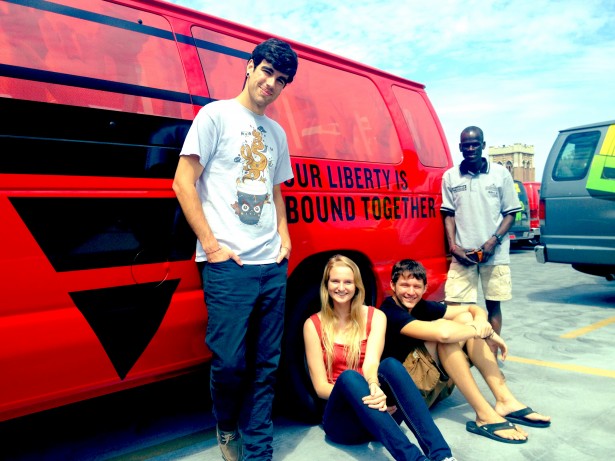“No one is above grace, but no one is below it either.”
Before our Roadies embark on the road to tour Invisible Children films, it is tradition to host mock screenings in San Diego. They get to practice speaking, work out kinks, set up tech equipment, etc. Which means that our 20 teams are in mock-mode before they set off this weekend for all of the U.S., Mexico, Canada, and Puerto Rico to tour our new film.
The Greater Los Angeles Roadie team recently hosted a practice screening at a local Juvenile Detention Center. It turned out to be one of the greatest experiences that these Roadies never saw coming; a true testament to the power of humanity, grace, and understanding. Two of the team members, Austin and Claire, weigh in.

L-R: Austin, Claire, Christian, Quinto
“To be honest, I was nervous about the thought of speaking to young boys who I imagined would become rude or aggressive during the presentation. At the very least, I doubted that they would give a second thought to what we had to say. But I would soon come to experience firsthand the power and passion of the invisible and neglected children in my own community.” (A)
“I didn’t really know what to expect. I knew we had to bring our ID and wear closed-toe shoes and conservative clothing, but that was it… It was intimidating. I was excited to be there, but I just didn’t really know how to act. Talking to criminals about apprehending other criminals is not something I do on a daily basis. It felt unnatural.” (C)
“At Invisible Children we encourage people to have an open mind and appreciate the common humanity in one another. When we see one another as a stereotype or label, it strips away that common element. We dehumanize one another. But even I am guilty of this and I have to admit that I approached our first screening with the wildly incorrect notion that the young boys in this juvenile detention center were inherently bad kids. That couldn’t have been further from the truth.” (A)
“I couldn’t help but cringe at parts in the [Kony 2012] film that talked about holding criminals accountable for their crimes. I was scared of offending them, coming off accusatory.” (C)
“I have spoken in front of thousands of high school students at a time and have had to deal with the best and the worst students that public high schools have to offer. But none were as respectful or engaged as this group of boys. They sat quietly through the entire film, listened attentively as my teammate Quinto Okello shared his experience, and asked very intelligent questions.” (A)
“When we talk about the inherent value of each human life, it’s easy for me to remember the orphan. The widow. The victim. We usually have no trouble empathizing with the oppressed, but we struggle to find the same value in the oppressor. As I sat and talked with these guys after the screening, every bit of discomfort vanished. I wasn’t talking to criminals – I was talking to humans.” (C)
“After the screening, we broke up the group and had the boys write letters to their representatives. I have to admit that I wasn’t expecting much. Why would a group of juvenile delinquents want to write letters about an issue that doesn’t affect them? These boys probably had larger concerns with which to challenge their congressmen than a rebel army thousands of miles away on another continent. But my expectations were once again shattered. It seemed as if these boys were just waiting for someone to tell them that they had a voice and that they could do something that mattered in the world.” (A)
“Just like me, these boys have dreams and ideas and fears and challenges. In some way, we’re all searching for the same things. They’ve done things they’re not proud of, but haven’t we all? No one is above grace, but no one is below it either.” (C)
“After all was said and done, the most powerful lesson I learned was a simple one: we are all human. It is only circumstance that separates myself from a child soldier, or from a juvenile delinquent. Why should our situations dictate the way the world sees us? It is only by recognizing this common humanity that we can learn to respect and love each other as we really are. I mean, our liberty is bound together, isn’t it?” (A)
“I walked out of that place with strengthened faith in humanity and a reminder of our universal need for each other. If that was only a practice screening, I can’t wait to see what the rest of tour will bring.” (C)
(Photo credit: The Atlantic)

Think people should hear about this?